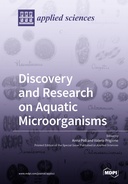Explore

Discovery and Research on Aquatic Microorganisms
0 Ungluers have
Faved this Work
Login to Fave
Aquatic environments, including freshwater and marine ecosystems, raw and treated sewage, sludge, and sediments, are home to a huge variety of microorganisms that mediate the recycling of dissolved organic carbon and recalcitrant substrata into food webs and the atmosphere. Archaea, bacteria, filamentous fungi, and yeasts play a key role in degradation processes, and many of them are used or have the potential to be harnessed in bioremediation. The importance of aquatic microorganisms is in their physiology and behavior: they can sink or float, some are motile, others adhere to a range of biotic and abiotic substrates (e.g. algae, invertebrates, sediments, driftwood), and they can form biofilms on surfaces, remain planktonic, or produce a broad diversity of bioactive compounds. By gathering a collection of papers focused on microorganisms in the over-cited environments, this Special Issue will improve the current knowledge of aquatic microbial biodiversity.
This book is included in DOAB.
Why read this book? Have your say.
You must be logged in to comment.
